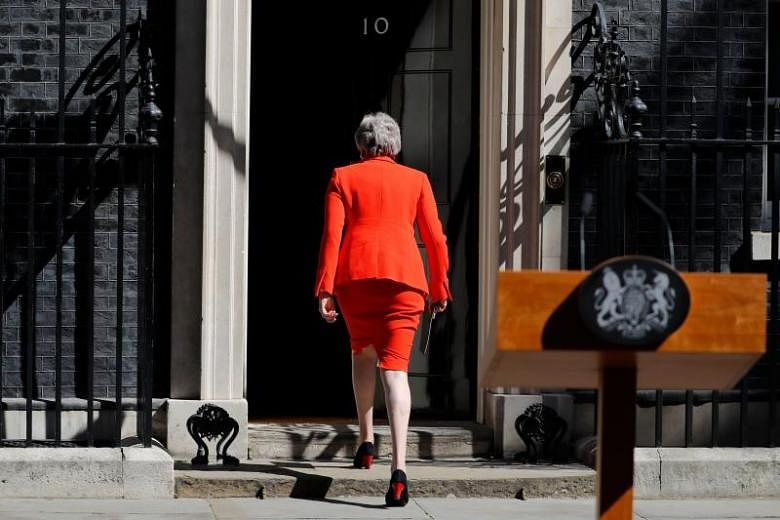LONDON (BLOOMBERG) - Mrs Theresa May was dealt a poor hand when she became Prime Minister, and proceeded to play it very badly.
Perhaps no leader in 2016 could have satisfied British expectations of Brexit. Advocates of leaving the European Union had made many promises about the benefits and been deliberately vague on the details. But Mrs May's approach of taking decisions in a tight circle left her without allies when the going got rough - both at home and in European capitals.
Mrs May had been prime minister for 18 months before she allowed her Cabinet to discuss what kind of relationship the UK should have with the EU after it had left. This was eight months into the two-year negotiating period and long after Mrs May had laid out a series of contradictory red lines. It was no surprise that few members of her government felt obliged to defend her decisions.
Likewise, Mrs May refused to make Brexit, the biggest foreign and economic policy decision the country has faced in decades, a cross-party effort. She alienated rank-and-file members of her own Conservatives, dismissed opponents as anti-Brexit and put Scotland's nationalists back on a war footing for independence.
Only Northern Ireland's Democratic Unionist Party, which was propping up her Conservatives in power, was consulted. Even it complained of being frozen out of key decisions. When Mrs May realised she would need more votes to get her Brexit deal through Parliament, it was too late to look for it.
A snap general election in 2017 had exposed her shortcomings as a political campaigner and left her with neither authority within her party nor a majority in Parliament. From that point, she stayed in place only because her Conservative Party was unable to agree how to replace her.
The final weeks before she was forced out replayed the mistakes of her premiership at great speed. With Parliament deadlocked and suspicious, ministers would promise something, only to find the Prime Minister apparently contradicting them. First a no-deal Brexit was off the table, then it was a likely option, then it was off the table again. The only sure thing was that the EU was adamant that negotiations were over.
She opened talks with the opposition Labour Party, but her three years of making Brexit a party political issue meant that neither side had much room to compromise.
After so many disastrous moments, it's hard to choose a point where it became clear that Mrs May, 62, was doomed.
For many Members of Parliament, it was a televised statement in March after being forced to delay Brexit. She blamed them for the government's problems, and pitched herself as the ally of the angry public against intransigent politicians. MPs, already on the receiving end of death threats, were furious.
"When Theresa stood for leader, she made a virtue of the fact that she wasn't clubbable, that she would take decisions slowly after listening and consulting widely," said Mr Will Tanner, who had been an aide to Mrs May. "Three years later, that lack of clubbability was seen as a massive weakness and the deliberative approach was indecision."
In June 2016, as the UK voted by 52 to 48 per cent for Brexit, Mrs May had seemed like the only adult in the room. Her predecessor, Mr David Cameron, had spent six years governing in a laid-back manner. Now his project was in ruins, destroyed by a referendum he had called.
Mrs May is the daughter of a Church of England minister. She owed her position to hard work rather than contacts. She had spent six years as home secretary, dealing with terrorists and riots. Her record included a willingness to confront people with hard truths, once telling her fellow Tories that they were seen as "the nasty party".
When she took office, Mrs May interpreted the vote for Brexit as a cry of frustration with the wider political class. She had advocated remaining in the EU, though vowed to deliver on the result.
But there were political misjudgments.
Instead of engaging Parliament and the country in a discussion about the inevitable trade-offs Brexit would require, Mrs May answered all questions with a mantra of "Brexit means Brexit, and we will make a success of it".
Anti-Europeans in her party were delighted when she announced that "no deal is better than a bad deal". The refusal to publicly engage with the complexities of Brexit had the short-term pay-off of allowing almost everyone in her party to believe that she could be persuaded to back their vision.
The long-term result, though, was that no one was prepared for the compromises Mrs May would ultimately have to make.











